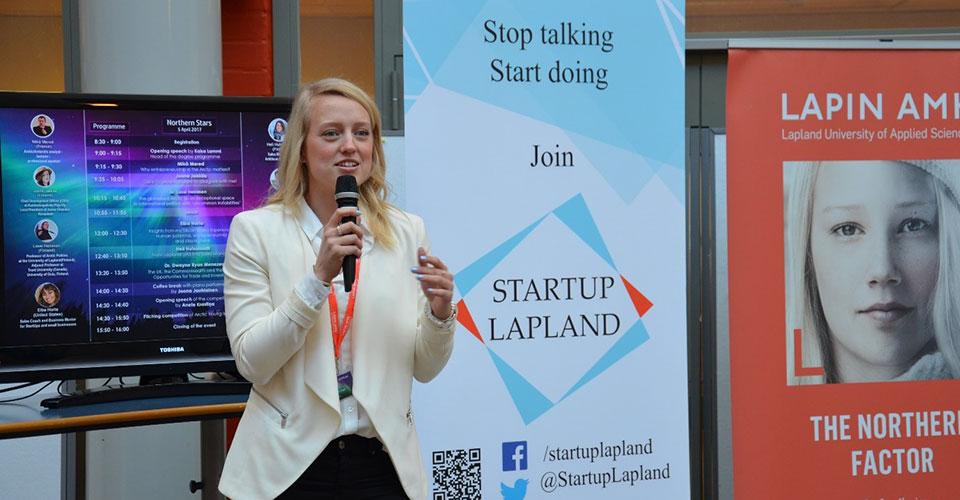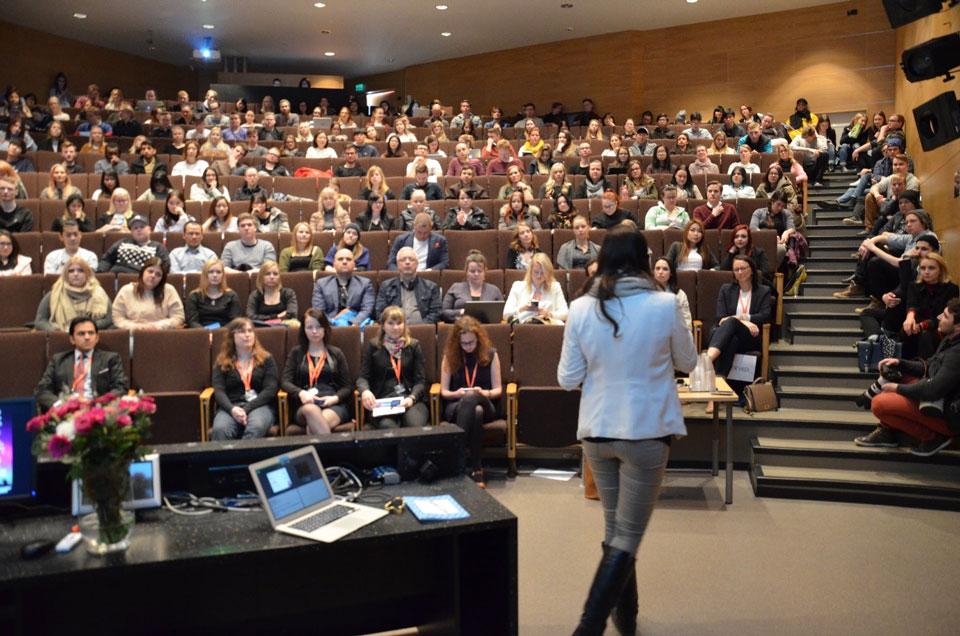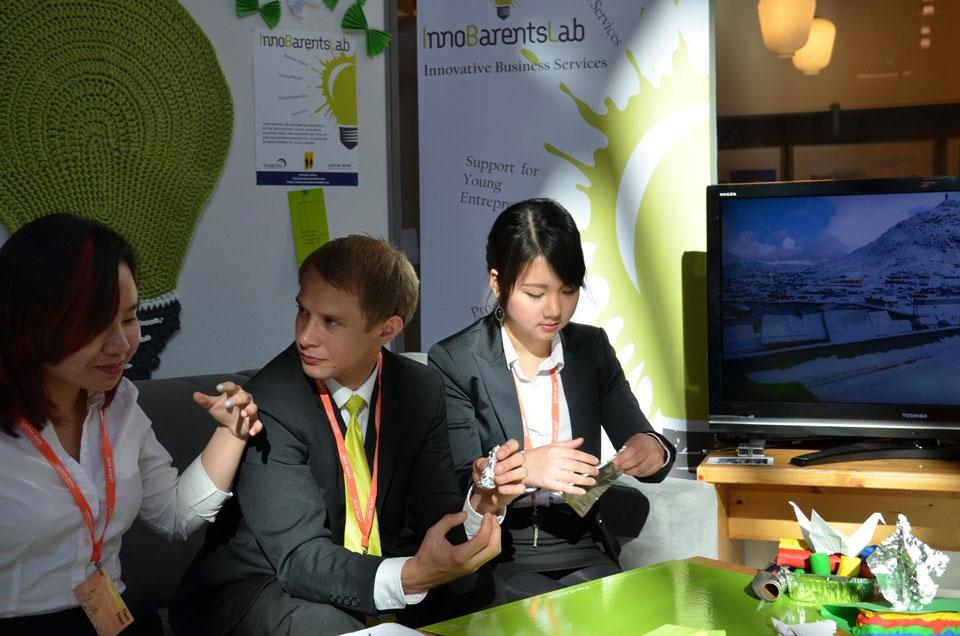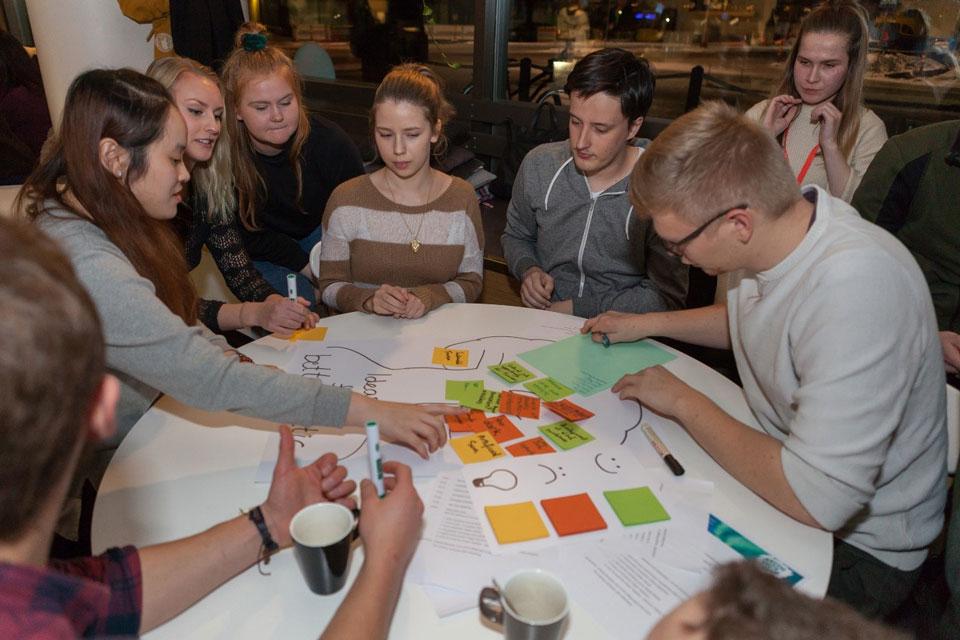
Anzelika Krastina
Entrepreneurship is no longer just an option, but vital for the survival and development of the Arctic regions. The Fourth Industrial Revolution comes with benefits as well as with the threats, such as job losses, climate change and globalisation. These are just few factors that clearly indicate that the world is changing rapidly, and the job and work environment in the 21st century differs from that of the 20th century. Being entrepreneurial is a decisive factor of current national and global economy, it is a new source of innovation for our societies and economies. It is even more relevant to the circumstances of the Arctic regions. Lapland region in Finland belongs to the so-called Arctic circumpolar region and shares common challenges with other Arctic regions, which among others are about cold climate, direct effects of climate change, long distances between settlements, scarce population, economy domination by heavy industries and urgent need for diversification of local economies. Therefore, entrepreneurship is considered as a solution to many socio-economic challenges in the region and education institutions. Lapland University of Applied Sciences takes this factor into account, incorporating entrepreneurship education and entrepreneurial attitude development in the strategy of education development.
The importance of entrepreneurship development and education in the circles of regional development in Lapland was in particular recognised soon after the global crisis of 2008. Moreover, in the cross-border cooperation forums in the Barents Euro Arctic Region, stakeholders raised the issue of young people leaving the northern regions for better economic opportunities in the south and the need to find solutions that would reverse the flow of migration. As a rule, it was mostly educated young capital that was a big loss to the region. Having similar challenges in Arctic regions in Europe, many stakeholders, including regional authorities, universities, local communities and activists came to a common vision to enhance entrepreneurship among young people and local communities. (Arctic Smart Rural Community , 2019). Lapland University of Applied Sciences played a big role in further initiatives and endeavours (Lapinamk, 2019).
Creative entrepreneurship is an approach for developing the Arctic. Taking into account specific circumstances of the region, one can realise that traditional entrepreneurship approach cannot be the most suitable way for the purposes of entrepreneurial development in the region. Arctic region cannot be compared to the regions such as Silicon Valley in the USA or many regions in central Europe with condensed population of networked entrepreneurship, investment and society. What is the advantage of the northern European or Arctic regions in Europe, is certainly its human capital. The entire Circumpolar Arctic is well covered with educational institutions producing highly educated human capital across the Arctic. Most importantly, there is a great platform for interacting across the Arctic among the institutes in the form of one network under the umbrella of the University of the Arctic. Also called UArctic, it is a cooperative network of about 200 network universities, colleges, research institutes concerned with education and research in and about the North (University of the Arctic, 2019).
Creative approach to entrepreneurship development can be reflected through the experiences of various national, regional, cross-border and international projects and initiatives. The projects and initiatives have different scope, aim and context, but however, there will never be the same repetitive approach. Each of the initiatives is searching for a new innovative way to approach the matter of entrepreneurship development. What is most important, these activities are not taking place somewhere on the side, but are directly integrated with the educational processes at the university. Entrepreneurship education is nowadays directly incorporated with the curriculum and education offered at the Lapland UAS and partner educational institutions. In order to better illustrate creative and innovative ways of entrepreneurship development facilitation, several initiatives are introduced below.
Northern Stars – Creative Entrepreneurship in the North

The so called “Northern Stars” seminar evolved as a student project into a large international seminar aiming to disclose the challenges and opportunities for the entrepreneurship in the north and to encourage entrepreneurship among young people. As a rule, it combines key-note presentations, success and failure stories by entrepreneurs from the Arctic region and in addition a variety of innovation workshops. The 2017 seminar was a great success when all the 200 seats and every single staircase were taken by the audience, which marked the interest and growth of the event from 30 participants from the starting year in 2011 when the initial event was called “Strengthening the North – Let’s stay here”. It was the initiative of the students to discuss the ways on how to motivate young people to find good opportunities in the north instead of moving to the south.
InnoBarentsLab – “a safe place to fail”

Initially, the lab was created as a platform and environment for young people to develop and test their business ideas with the assistance of business coaches. Currently the activities of the lab have a focus on the so called impact entrepreneurship, sustainable solutions for the Arctic communities and social entrepreneurship. “Breaking the Ice” was a project created by students to help the integration of immigrants into the local Lapland community. “Give back to Finland” was a student project by foreign students, who felt a gratitude towards the state in Finland for a great education and opportunities. The activities of the project included events in the elderly homes, kindergartens, hospitals with the performances and different cultural events. Currently the challenges of climate change and in particular, the actions needed for sustainable Arctic development are the core of the innovation lab.
Creative Steps 2.0 methodology to facilitate innovations across the borders
Challenges of a more globalised world, current working environments and changing nature of business in the context of Arctic region livelihoods requires a creative and innovative mind-set and ability to work across distances, which could be done with the use of modern technologies. Within the project Creative Momentum, co-founded by the EU Northern Periphery and Arctic Programme (2015–2018), a group of experts was working on developing such a collaborative innovation model for the actors or businesses from creative industries across the north of Europe. Even though the world nowadays is filled with a variety of innovation methodologies and tools, it was difficult to find a suitable solution when it comes to online collaboration. An innovation workshop called Creative Steps 2.0 was created as a response to the named challenges. In practice, the participants involved collaborate online on distance and create new products, services, or innovate entire business models. Creative Steps 2.0 model is also a response to the need to develop education and training methods that will encourage entrepreneurship and the networking of companies in remote Northern European regions.

The Creative Steps 2.0 (CS 2.0) innovation workshop model is not a typical business development and innovation workshop and can be considered as an innovation result of a Creative Momentum project. It is distinguished from many other innovation workshops for the following reasons. First, the CS 2.0 methodology aims to enhance cross-border collaboration and interaction between businesses and students with the help of coaches and external experts. Second, the CS 2.0 methodology aims to encourage the use of digital tools for better online and distance collaboration. Third, it offers simple patterns of activities (ten steps) that help all participants in the workshop to progress in their work from one step to another with clear tasks and outcomes. Therefore, it serves as a guideline process for participants in various entrepreneurship development situations. Such business development process seems to be in particular suitable when the businesses in creative sector are engaged with multidisciplinary student teams.
According to the participants during the project, cooperation and working over distance is certainly a business trend that has already emerged. It has been noticed that the use of online tools among small creative businesses and young start-ups is not yet a daily routine, neither are they used as effectively by students or academics. Therefore, the workshops were a great opportunity to test various online tools for digital cooperation and to enhance digital ability, which is extremely important for all participants: businesses, companies and also future education. Online working, as a part of the workshops, proved to all participants that distance is not an obstacle. When an entrepreneur from Finland is meeting with an entrepreneur from Northern Ireland even online and co-operating with a creative student team again in a different location, it can produce really great results. (Creative Steps 2.0, 2019)
Apart from the mentioned creative entrepreneurship development initiatives, there are many other projects taking place, such as Arctic Valley business simulation game, Arctic Youth Forum, Arctic Business Dating match-making events, SMART practice or so-called integrated purpose-driven practical training and Entrepreneurship path integration into education which gives the opportunity to students and many others to engage with entrepreneurial experiences. Actual outcomes of all these initiatives need to be assessed in more detail, however, the proof of positive outcomes already now can be measured with many new start-ups and increased confidence about the entrepreneurship as a possible alternative for a career choice among young people in the Arctic regions.
Author
Anzelika Krastina, M.Ed., Senior Lecturer, International coordinator, School of Northern Well-being and Services, Lapland University of Applied Sciences, anzelika.krastina(at)lapinamk.fi
References
Arctic Smart Rural Community. 2019. https://arcticsmartness.eu/arctic-smart-rural-community/, retrieved 15.10.2019
Creative Steps 2.0. responds to the challenges of a globalised world. MyCreativeEdge project. https://mycreativeedge.eu/deep-in-thought-item/creative-steps-2-0-responds-to-the-challenges-of-a-globalised-world/ , retrieved 15.10.2019
InnoBarentsLab. 2019. http://www.innobarentslab.org/, retrieved 10.10.2019
Lapinamk. 2019. https://www.lapinamk.fi/en/Who-we-are , retrieved 12.10.2019
Northern Stars Seminar https://www.facebook.com/northernstarsseminar/ retrieved 15.10.2019
University of the Arctic. 2019. https://www.uarctic.org/, retrieved 10.10.2019



